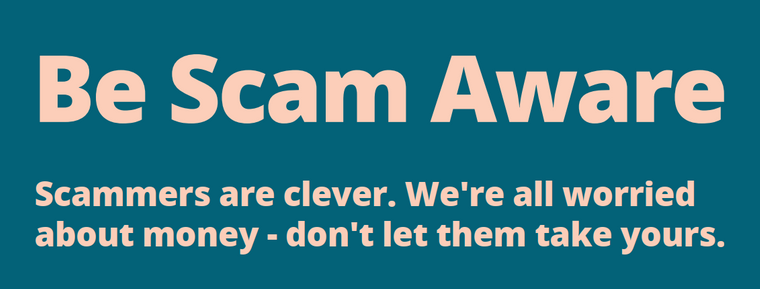
As a member of the Consumer Protection Partnership (CPP), which includes consumer protection bodies such as Citizens Advice, the Competition and Markets Authority and the Trading Standards Institute, we are raising awareness of and supporting the annual CPP Scams Awareness Campaign. With the cost-of-living crisis hitting individuals and households across the UK it is vitally important, more than ever, that we help protect people from opportunistic scammers.
Figures released by Citizens Advice show that over 40 million people have been targeted by scammers as the cost-of-living crisis bites. That’s over three quarters of UK adults, a 14% increase on this time last year.
Scams come in all forms, from face-to-face doorstep selling tactics to online scam ads, and from telephone calls to post. In line with the cost-of-living crisis, anecdotally we’re seeing an increase in complaints about fake energy saving devices. While scams can have devastating financial consequences, they can also cause significant emotional damage and impact on victims’ mental health and wellbeing.
As part of the campaign we’re highlighting some of the most common types of scams and providing tips to help people protect themselves from scammers. And, although we’re not a law enforcement body and don’t have the power to tackle criminal activity, we are reminding people of the part we’re playing in disrupting online scams through our Scam Ad Alert System.
We launched our Scam Ad Alert system in partnership with major online ad and social media platforms to help tackle scam ads online. We launched the system because, while the overwhelming majority of ads responsibly inform and entertain their audience, some are published with criminal intent. Scam ads lead unsuspecting consumers to sites which fleece and leave them out of pocket.
We encourage anyone who spots a paid-for online scam ad to report it to us so that we can take action to have it removed. You can report scam ads appearing in paid-for spaces online to us via our online form. We assess reports within 24 hours, enabling us to quickly and effectively alert platforms to scam ads so that they can promptly remove them, suspend the advertisers’ accounts and stop similar ads appearing in future.
Read about our Scam Ad Alert system in more detail here
Advice and tips for Consumers
Citizens Advice has provided a list of the most common types of scams that are reported and which include:
- Deliveries, postal or courier services (55%)
- Someone pretending to be from the government or HMRC (41%)
- Someone offering a fake investment or financial ‘get rich quick’ schemes (29%)
- Rebates and refunds (28%)
- Banking (27%)
- Online shopping (24%)
- Health or medical (13%)
- Energy scams (12%)
To help avoid falling for these scams, Citizens Advice has provided the following tips:
- It seems too good to be true – for example, scammers pretending to be energy
companies to lure people into “too good to be true” deals – err on the side of caution, delay any decision until you’ve had time to chat to friends, family or your bank - You suspect you’re not dealing with a real company, organisation or a genuine person –
take a moment to step back and double-check - You’ve been pressured to transfer money quickly
- You’ve been asked to pay in an unusual way – like by an iTunes vouchers or a transfer
service - You’ve been asked to give away personal information such as passwords, PINs or other
verification codes.
And, if you’ve fallen victim to a scam, do one or all of the following:
- Talk to your bank or card company immediately if you’ve handed over any financial and sensitive information or made a payment
- Report the scam to Citizens Advice. Offline scams, like telephone, post and doorstep, to the Citizens Advice website or by calling 0808 223 1133.
- Report online scams to the dedicated Scams Action service either online or on 0808 250 5050
- Text scams can be reported to your mobile phone provider by forwarding it to 7726
More on
-
Keep up to date
Sign up to our rulings, newsletters and emargoed access for Press. Subscribe now.


